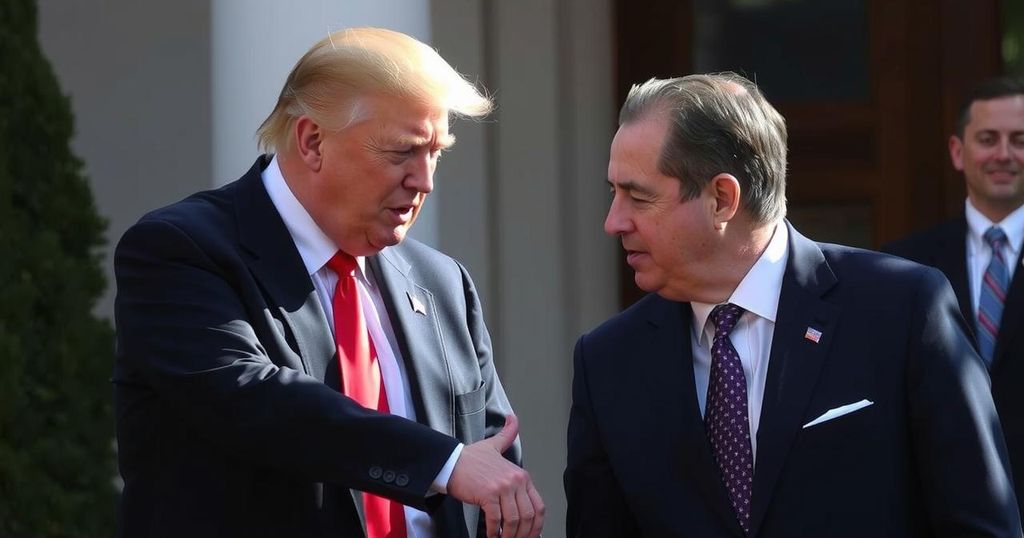Donald Trump welcomed Argentine President Javier Milei to Mar-a-Lago, marking his first post-election meeting with a foreign leader. Their discussions, described as cordial, focused on shared political ideologies. Milei lauded Trump’s victory and criticized leftist policies, while Trump praised Milei’s leadership, highlighting their growing alignment against globalist approaches.
On Thursday, Donald Trump hosted Argentina’s President, Javier Milei, at his Mar-a-Lago estate, marking the first engagement with an international leader following his recent electoral success. According to an unnamed source who spoke with The Associated Press, the meeting was characterized as amicable and was conducted privately. During his visit, Milei also engaged with investors before addressing attendees at the America First Policy Institute’s gala, which took place at Trump’s Palm Beach venue. In his speech, presented in both English and Spanish, Milei condemned what he identified as “left-wing ideologies”, commending Elon Musk for his contributions to societal progress through his platform, X (formerly known as Twitter). He vehemently criticized the global political elite, claiming, “Today, we are living under a political system that redistributes wealth at gunpoint,” and proclaimed it essential to rebuff this dynamic. Milei, who self-identifies as an “anarcho-capitalist,” has garnered attention for his energetic and confrontational governance style. He used this meeting as an opportunity to extend his congratulations to Trump, stating, “The winds of freedom are blowing stronger today,” suggesting Trump’s victory serves as a signal that divine support favors his agenda. In reciprocation, Trump expressed admiration for Milei’s approach and policies, stating, “The job you’ve done is incredible. Make Argentina Great Again, you know, MAGA. He’s a MAGA person,” eliciting applause from the audience. The budding camaraderie between the two leaders is not novel; Trump has consistently endorsed Milei since his election win in November 2023, having previously engaged with him at the Conservative Political Action Conference (CPAC). Javier Milei’s rise to prominence is attributed to his distinctive approach to politics, often symbolized by his campaign attire that included a chainsaw, representative of his promises to dramatically cut public expenditure and reform governmental structures. His confrontational style, coupled with an anti-establishment stance, has cultivated both a polarized reputation and garnered a loyal following in Argentina. The interaction at Mar-a-Lago underscores a growing synergy between Trump and various Latin American leaders who share a commitment to national agendas that push back against perceived globalist encroachments. This meeting exemplifies the alignment of their political objectives and philosophies, aimed at restructuring their countries’ governance to reflect their ideological beliefs.
The meeting between Donald Trump and Javier Milei is significant as it marks a new chapter of international relations post-Trump’s electoral victory. Milei, having established himself as a fierce right-wing leader in Argentina, shares ideological similarities with Trump, particularly in their populist rhetoric and critique of globalism. Both leaders advocate for a return to nationalistic policies against what they consider an overreach by global political structures. This gathering exemplifies a trend of rising right-wing leadership in Latin America, reflecting a shift towards more conservative governance in the region following years of left-leaning dominance.
In conclusion, the meeting between Donald Trump and Javier Milei highlights a mutual recognition of shared ideologies and the strengthening ties between the two leaders. Their respective political platforms resonate with a growing electorate disillusioned by traditional political establishments. The collaboration between Trump and Milei exemplifies a broader movement towards nationalistic agendas in both the United States and Latin America, suggesting a significant shift in international relations and domestic policies.
Original Source: www.newsweek.com






